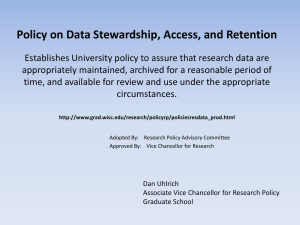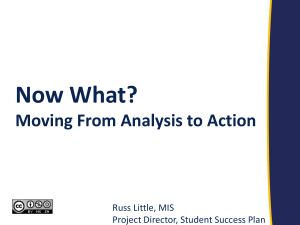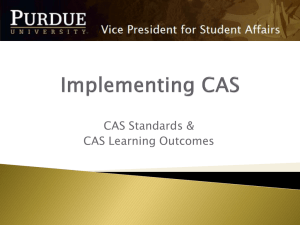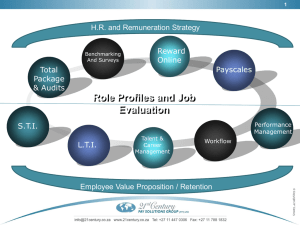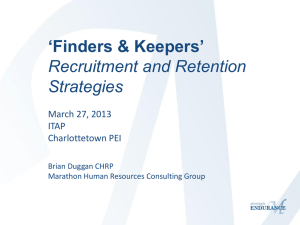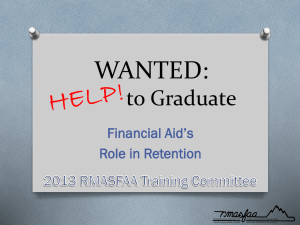Behavioral and Health Science
advertisement
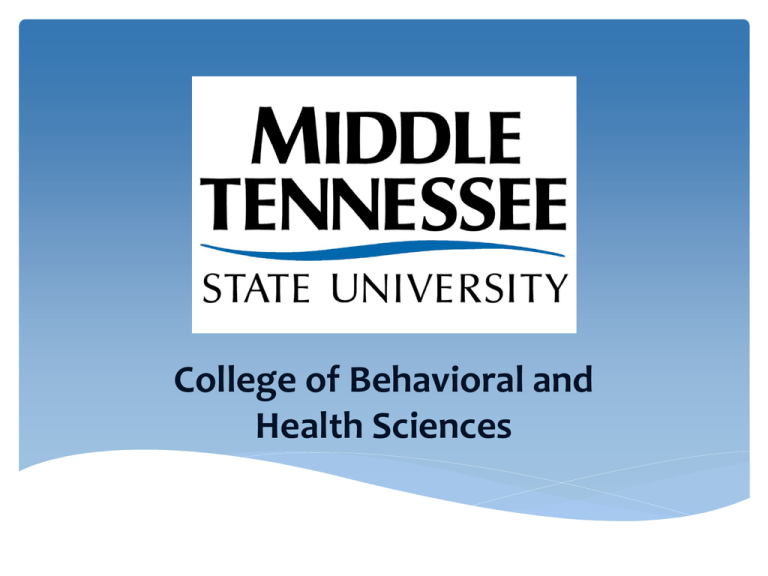
College of Behavioral and Health Sciences College of Behavioral and Health Sciences Student Success and Retention Report Department of Criminal Justice Retention Plan for Academic Majors Retention Goal Strategy Expected Outcome Assist students with their basic questions by providing FAQ brochures. Accessible & informative FAQ Brochure made available for students needing program information. Many student questions will be answered by utilizing the annually updated brochure. Clarify and communicate timely curricular progression toward completion of the degree major. Post a curricular map for the degree program by year of student in the undergraduate catalog and on the department website; review and update map annually. An easily accessible academic guide that students can use to facilitate their academic planning for enrollment decision-making and for mapping progress toward degree completion. Determine retention problems among CJA students. Administer surveys to students in selected upper classes each semester to determine problems or frustrations that might affect retention. Identified concerns or problems will be addressed by: Communicating student feedback to CJA advisors, CJA chair and other relevant MTSU units for appropriate action. By what date Student Success Outcome Person(s) Responsible Annual As reflected on survey, students will find brochure helpful. Department Chair & CJA Faculty Advisors Annual As reflected on survey, students will find curricular map helpful. Department Chair Annual Tracking of students will reveal an improvement in retention rates. Department Chair & CJA Faculty Advisors College of Behavioral and Health Sciences Student Success and Retention Report Department of Criminal Justice Retention Plan for Academic Majors Retention Goal Strategy Expected Outcome Monitor CJA majors in upper division courses who have excessive absences or failing grades. Provide appropriate assistance. CJA instructors will use academic alert system to communicate with CJA majors who have excessive absences or failing grades. Information will be relayed to CJA advisor to coordinate student interactions which may include individual or group meetings or informal gatherings. Build community and involvement Develop and use student clubs and meetings to facilitate community, cohorts, and mentoring. CJA faculty will meet once a semester to update needs and accomplishments in this area. By what date Student Success Outcome Person(s) Responsible Annual An increase in the number of students who stay on track in their CJA courses. Department Chair & CJA Faculty Advisors Annual More active participation of students in University and CJA programs; improved culture of learning. Department Chair & CJA Faculty College of Behavioral and Health Sciences Student Success and Retention Report Department of Health and Human Performance Retention Plan for Academic Majors Retention Goal Strategy Expected Outcome By what date Student Success Outcome Person(s) Responsible Removing barriers 1) Aggressively support advisement efforts at the department and area levels 2) Provide materials to students via webpage, Facebook, and other media 1) Students will enroll in courses at the appropriate time 2) Better informed faculty and students Current 1) Improved enrollments by Area 2) Improved advisement decisions Department Chair, Area Coordinators, Department Advisor Building Community 1) Develop and use student majors clubs to facilitate community, cohorts, and mentoring 1) More informed students; develop a culture of learning by Area May 30 Area Coordinators, Department Advisor Teaching Changes 1) Coordinate office hours with instruction 2) Track student attendance more closely using Academic Alert System; coordinate with advisement 1) Make faculty more accessible to students. 2) Catch problems with students earlier that are related to attendance Spring 2013 1) More active participation of students in each program; improved learning and academic performance 1) More frequent and better quality advisement with faculty 2) Better performance related to class attendance; better grades May 2013 Area coordinators, individual faculty; checked by Areas and the Department Chair College of Behavioral and Health Sciences Student Success and Retention Report Department of Health and Human Performance Retention Plan for Academic Majors Retention Goal Strategy Advising Changes Use department advisor to coordinate department advisor efforts Expected Outcome Consistent overall advisement effort; sharing of ideas to improve performance By what date Current Student Success Outcome Improved info to students will likely yield better more timely decisions; students are in programs that better fit their strengths Person(s) Responsible Department chair, department advisor College of Behavioral and Health Sciences Student Success and Retention Report Department of Health and Human Performance • • • Physical Education has a “case by case” tutoring program. Professors regularly invite students to meet for further assistance if a student is struggling in class or just with a new concept. During methods/practicum courses students are advised, as needed, to schedule meetings to help with their planning and teaching requirements. Exercise Science Focus Group meets Thursdays from 9-10 pm in the Smith Hall dorm on campus. Anyone in EXSC can go to the Smith Hall Lobby and study for their classes with fellow classmates, study for the Major field test, a certification exam, or work on internship projects. Kinesmetrics: Measurement and Statistics Analysis is available in the Kinesmetrics Laboratory. The lab offers consulting/tutoring services for many research-related topics, such as research design options; formulation of hypotheses; measurement issues; data collection, organization, and screening; statistical analysis and computing; interpretation of findings; and report writing and grant proposals. Consulting/tutoring hours vary by semester and can be found at http://mtsu.edu/kinesmetrics/Consultation_Sign_Up.php College of Behavioral and Health Sciences Student Success and Retention Report Department of Human Sciences Retention Plan for Academic Majors Retention Goal Strategy Expected Outcome By what date Student Success Outcome Person(s) Responsible Communicate the diversity of programs within Human Sciences. 1) Update and maintain department website that tells the Human Sciences “story.” 2) Provide “Overview” and links to online catalogue curriculum guides for each program area. 1) Provide individual and group advising opportunities with highly organized program charts or checklists provided to students. 2) Provide courses each semester that are aligned with program charts or checklists. 1) Engage students. 2) Assist students with academic planning. June 30 Maintain or increase number and diversity of student events/ accomplishments submitted and placed on department web site. Department Chair, Program Coordinators, Faculty and Staff 1) Program chart or checklist students can use for academic planning. 2) A student can matriculate per the program chart or checklist. June 30 Maintain or increase the number of students who complete coursework per program chart or checklist. Department Chair, Academic Faculty Advisors, Program Coordinators Continue to plan and implement student events and activities: • MTSU Student Chapter ASID • Student Dietetic Association • MTSU AAFCS Student Chapter • F.A.D.S. • Universities Fighting World Hunger MTSU Student Chapter Engage students. June 30 Maintain or increase student participation. Department Chair, Student Organization Faculty Advisors Clarify and communicate timely curricular progression toward completion of the degree major. Build student community and professional development opportunities through student organizations and community service. College of Behavioral and Health Sciences Student Success and Retention Report School of Nursing Retention Plan for Academic Majors Retention Goal Strategy Expected Outcome By what date Student Success Outcome Person(s) Responsible Create consistent 1) For each program record keeping to determine time frame for determine true program completion retention rate for each 2) Set up tracking system for program plotting each student’s a. BSN progress b. RN/BSN c. MSN d. HCI (MSPS) Explore programmatic 1) For example - An changes that might introductory course PRIOR contribute to retention to admission to the nursing program A clearer method to identify actual retention data and demonstrate changes in rate June 30, 2013 Students will be identified who are not progressing in their respective program For BSN, Admission and Progression Committee Students would better understand the profession and what is expected of nurses before devoting several semesters Annual Evaluation Success would come from creating classes of students who truly want to be in nursing Curriculum Committee Expand opportunities for nursing students to maintain honors designation Qualified nursing students would not lose opportunity for this status by entering SON Annual Evaluation The SON would graduate more students with the honors designation – just like other disciplines Director and Faculty 1) Work closely with the honors college to assist appropriate students to graduate with this distinction For RN/BSN, MSN, & HCI, Online Advisor College of Behavioral and Health Sciences Student Success and Retention Report School of Nursing Retention Plan for Academic Majors Retention Goal Strategy Expected Outcome By what date Student Success Outcome Person(s) Responsible Seek additional ways to offer financial assistance to all students Use existing resources and find additional options for financing scholarships Students, particularly on the RN/BSN and graduate programs would not find it necessary to drop out due to financial constraints Annual Evaluation Graduation would become an easier goal if students didn’t have to keep full time jobs. Director and Development Officer for College Create a Peer Tutoring program Partner with Student Nurse Association to offer one Teaching others is a way to learn; students can share tips for learning Annual Evaluation There would be mutual benefit for upper and lower classmen/ women SNA Advisors College of Behavioral and Health Sciences Student Success and Retention Report Department of Psychology Retention Plan for Academic Majors Retention Goal Strategy Expected Outcome By what date Student Success Outcome Person(s) Responsible Improve advising and career planning Establish candidacy requirements for students to be admitted to the major Students who become psychology majors will be successful in their coursework and less likely to change their major. (may be effective as early as Fall 2013) Annual progress report Department Chair & Undergraduate Coordinator Establish a pre-major advising center for students who want to be psychology majors; assign and train additional faculty to be transfer student advisors Students not doing well in their coursework will be directed to a different major in which they can be successful. Students accepted to the major will be successful in the coursework. Students who might otherwise not see their advisor will. Students will be more likely to take their coursework per the Academic Map and submit their forms on time. (may be effective as early as Fall 2013 ) Annual progress report An increase in the number of students retained in the major after the freshman year and an increase in the number of students who pass their core major coursework. Students will be more likely to graduate in a timely manner and less likely to change their major at a later point. (may be effective as early as Fall 2013) Annual progress report Students will progress through the major per the Academic Map, thereby graduating in a timely manner. Department Chair & Undergraduate Coordinator Require advising for all psychology majors every 30 credit hours Department Chair & Undergraduate Coordinator College of Behavioral and Health Sciences Student Success and Retention Report Department of Psychology Retention Plan for Academic Majors Retention Goal Strategy Expected Outcome By what date Student Success Outcome Person(s) Responsible Improve advising and career planning Provide readily accessible advising materials for faculty and students in the form of an undergraduate handbook, student FAQ handout, academic maps, student-friendly website, and departmental bulletin board. Revise the Seminar on Careers in Psychology course and require that all pre-major students take it before declaring a psychology major. Students and faculty will have access to materials that will facilitate better course planning and timely progression through the major. Annual progress report Students will progress through the major per the Academic Map, thereby graduating in a timely manner. Faculty will be more knowledge about advising students. Undergraduate Coordinator Students will have more knowledge about career options in the field of psychology prior to declaring a major. (the revised course may be effective as early as Fall 2013) Annual progress report Students will choose electives and minors in accordance with their career plans and have more timely knowledge about the process of applying to graduate school in psychology. Provide current and comprehensive advising materials for faculty in the form of new faculty advisor training and advising materials and workshops. Faculty will be more knowledge about student advising and will provide more accurate and comprehensive advising to students. Annual progress report Students will receive better advising. Faculty teaching the Seminar on Careers in Psychology course; Undergraduate Coordinator, Undergraduate Curriculum Committee Undergraduate Coordinator College of Behavioral and Health Sciences Student Success and Retention Report Department of Psychology Retention Plan for Academic Majors Retention Goal Strategy Expected Outcome By what date Student Success Outcome Person(s) Responsible Improve academic support for required courses in the major Expand the tutoring program for the General Psychology course More students taking the General Psychology course will have access to tutoring resources. (may be effective as early as Spring 2013) Annual progress report Students who might otherwise fail will be more likely to pass General Psychology, thereby improving retention. Department Chair, Undergraduate Coordinator, & General Psychology Coordinator Establish and maintain a peer tutor/faculty tutoring program for all students in required core major classes. Students taking core classes will have access to tutoring resources. (may be effective as early as Fall 2013) Annual progress report Department Chair, Undergraduate Coordinator, & Psi Chi/Psychology Club Faculty Advisor Use the Academic Alert system in all core required major courses Students who are earning less than a C- will be reported for academic counseling and referred for tutoring. (pilot test may be effective as early as Fall 2013) Annual progress report Students who might otherwise not pass a class or withdraw from a course will be more likely to pass the first time, thereby improving retention and graduation rates. Students who might otherwise not pass a class or withdraw from a course will be more likely to pass the first time, thereby improving retention and graduation rates. Department Chair & Undergraduate Coordinator College of Behavioral and Health Sciences Student Success and Retention Report Department of Psychology Retention Plan for Academic Majors Retention Goal Strategy Expected Outcome By what date Student Success Outcome Person(s) Responsible Improve student engagement Focus on building student community via the Psi Chi and Psychology Club More opportunities for students to be engaged in the department, university, and community (Effective Spring 2013) Annual progress report Students who are engaged will be less likely to change their major and more likely to be retained and to graduate in a timely manner Formally involve students in departmental committees as student representatives More opportunities for students to be involved in department decisions affecting curriculum (effective Fall 2013 with the formation of new committee members) Annual progress report Students will feel more involved and engaged in the department. Department Chair, Undergraduate Coordinator, & Psi Chi/Psychology Club Faculty Advisor Department Chair, Undergraduate Coordinator, Committee Chairs Formally involve students in faculty research and applied experiences. More opportunities for students to be engaged in the department. Annual progress report Students will be more engaged and will be better prepared for graduate school admissions or for a career. Department Chair; faculty College of Behavioral and Health Sciences Student Success and Retention Report Department of Psychology Retention Plan for Academic Majors Retention Goal Strategy Expected Outcome By what date Student Success Outcome Person(s) Responsible Improve student engagement Provide opportunities for students to learn about faculty interests and research through an annual Brown Bag series More opportunities for students to be engaged in the department Annual progress report. Students will be more engaged and will have the opportunity to learn about and become involved in faculty research. Department Chair; Brown Bag committee College of Behavioral and Health Sciences Student Success and Retention Report Department of Social Work Retention Plan for Academic Majors Retention Goal Strategy Expected Outcome By what date Student Success Outcome Person(s) Responsible Clarify and communicate timely curricular progression toward completion of the degree major Post a curricular map for the degree program by year of study in the undergraduate catalog ; review and update map annually An easily accessible academic guide that students can use to facilitate their academic planning for enrollment decision-making and for mapping progress toward degree completion A student can matriculate per the curricular map Annual An increase in the number of students who complete coursework per the curricular map Department Chair Annual Report Date Alignment of course offerings permits timely progression toward major degree completion Department Chair Review course offerings each semester to ensure that course offerings are aligned with the curricular map College of Behavioral and Health Sciences Student Success and Retention Report Department of Social Work Retention Plan for Academic Majors Retention Goal Strategy Expected Outcome By what date Student Success Outcome Person(s) Responsible Improve academic advising Conduct a faculty advisor workshop within the department each fall semester to exchange ideas and best practices Improved academic advising for the academic major Annual Report Date An increase in the number of students who access and/or receive intrusive academic advising Faculty Advisors Conduct small group advising sessions for majors and premajors prior to early registration each fall and spring semester Improve academic advising for the major Annual Report An increase in the number of students who access and/or receive academic advising Faculty Advisors Develop informational workshops on How to Successfully Complete the application to the major. Increase student ability to successfully apply to the major Annual Report An increase in the number of students who submit application packets that are complete and accurate Faculty Advisors College of Behavioral and Health Sciences Student Success and Retention Report Advising Reports Number of appointments scheduled by Appointment Plus Advisor Spring 2012 Summer 2012 Fall 2012 Total Brelinda Johnson 526 363 719 1608 Helen Gleason 485 195 537 1217 Kelsey Szpara N/A N/A 296* 296 1,011 558 1,552 3,121 Totals *Kelsey Szpara began advising students on August 27, 2012 College of Behavioral and Health Sciences Student Success and Retention Report Advising Reports Number of students by event Event Number of Students Transfer Advising Days 158 CUSTOMS 715 March Advising Madness 245 Fall Advising Festival 220 Totals 1,338 College of Behavioral and Health Sciences Student Success and Retention Report Advising Reports Assessment of CBHS Advisor Goals • Scheduling Appointments: Encouraged all advisors to see at least 10 appointments per day during high volume times (October – January and March – May) • Reevaluating advising forms – Advisors agreed to continue to use or start to incorporate CBHS registration checklist. Nursing advising sheet needs to be revamped to meet the needs of the students. It was suggested that pre-nursing students receive general education information only with requirements for the program listed on the back. College of Behavioral and Health Sciences Student Success and Retention Report Advising Reports Modest One-Time Retention Funding Requests $3,000 $500 for each of the six departments for student group “Meet and Greets” for AY 2013-2014 $2,000 Psychology Peer Tutor Program for AY 2013-2014 and AY 2014-2015 $3,500 Human Sciences – EHS 110A (adjacent to EHS 112) needs to be renovated for their Student Study Room/Lunch Area where students can study, eat lunch and informally interact with faculty. It is also going to be a meeting room for their student organizations.

